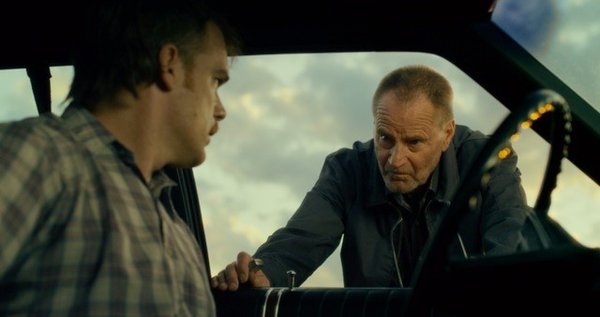Jim Mickle’s “Cold In July” is a peculiar mix of genres. At
times a revenge thriller, and at others a noir, slasher, with a splash of
grindhouse. It can get messy at times and there are some awkward changes in
tone, but it never fails to be entertaining and unpredictable.
The movie revolves around Richard Dane (Michael C Hall), a
mild mannered upstanding East Texas citizen with a wife and son who runs a picture-framing
store. The trouble begins when he shoots an intruder dead in his home in the
middle of the night. Being the passive nonviolent fellow he is, this event
leaves him nervous and shaking, even feeling guilty. Because of this guilt he
decides to go to the funeral of the man and runs into the intruder’s dad
Russell (Sam Shepard), who’s just been granted parole and isn’t happy.
In many respects Richard resembles a typical Film Noir
protagonist: the seemingly innocent civilian who puts his life and his family’s
on the line. For a while we think it’s going to be about Russell’s attempt to
kill Richard out of vengeance and Richard’s obligation to protect his family
from danger once again. And this is the way it plays out for a while, Russell
stalks the family, seeming to materialize out of nowhere similar to a horror
movie villain such as Michael Meyers. And Jeff Grace’s old school synthesizer
soundtrack gives this entire section a slasher film vibe.
However this story resolves itself after about twenty
minutes or so when the movie mutates into something totally different. Richard
becomes uncertain as to whether the guy he shot was actually Russell’s son and
becomes suspicious that there’s a cover-up involving the police. Things take an
even stranger turn when Russell and Richard join forces and together with
Houston private eye (Don Johnson, decked out in cowboy gear) try to uncover
what’s really going on.
In some respects “Cold in July” plays out like a pulpier
version of a Hitchcock film. Screenwriters Mickle and Nick Damici (based on the
book by Joe R Lansdale) keep the viewers on their toes the entire time, just
when you think you know how the movie is going to play out it takes a left turn
into darker and darker territory. Near the end when the final disturbing twist
of the plot is revealed (accompanied by Grace’s synthesizer music again) it turns
into a full-blown, gory 70’s/80’s grindhouse style movie.
Admittedly, “Cold in July” doesn’t have quite the same
finesse of a Hitchcock film, as I mentioned above there are some sudden shifts
in tone. The movie primarily wants to be dark in tone but at times it veers
into silliness, which doesn’t always work. I also thought Richard and Russell’s
transition from foes to friends was a bit abrupt. I find it strange that
Richard would be so quick to help Russell after being threatened by him. In
fact at one point Russell even breaks into his house and hides in the crawlspace
only to almost kill his son. Kind of creepy if you ask me.
Nevertheless, the picture still succeeds in being a tense
and compelling southern noir. Hall, who’s known mainly for playing a serial
killer with a strict moral code on the TV show “Dexter” does a fantastic job of
portraying an innocent family man who becomes capable of doing violent acts for
the sake of “good.” While Shepard goes from being an intimidating ex con in
search of vengeance to a concerned dad in search of truth and ultimately has to
make an extremely tough decision. And Johnson is amusing as the private eye
character that provides a little comic relief as the film mines darker and
darker territory.



